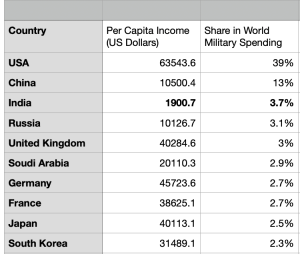The global hunger report 2021 puts India at 101 out of 116 countries. Neighboring countries like Pakistan, Bangladesh, and Nepal are also better in terms of hunger compared to India. The only country in Asia that is behind India is Afghanistan. The Indian government has expressed its shock on the latest ranking. They have brushed aside these findings by saying that they are “non-scientific”, but government’s own NITI Aayog said the same thing few years ago,
Niti Aayog’s SDG Index 2019, released on December 27, 2019, says that more Indians have fallen into poverty, hunger, and income inequality in the past two years. This is after a remarkable reduction in poverty between 2005-06 and 2015-16.
On the other hand the Prime Minister has unveiled a program of military buildup in India via seven state-run defense companies! Prime Minister said that the goal of this policy is,
to make India the world’s biggest military power on its own.
He also said,
a single-window system has been put in place instead of stagnant policies to develop India as a major producer of defense equipment.
Table 1 below shows military expenditure wise top 10 countries with their respective per capita income. I am making this comparison to demonstrate if India can afford to spend more money on military buildup.

We can clearly see the difference between India and other countries. India’s per capital income is only US$ 1900 but it still spends the third highest military expenditure in the world, behind USA and China whose per capital incomes are way higher than India’s. This means most Indians are dirt poor but its government has decided to become a super power!
Actions of the Indian government demonstrates its priorities. This reminds me of some of the fundamental principles of economic science. Gregory Mankiw’s Principles of Eonomics discusses some of these foundational principles as follows:
The management of society’s resources is important because resources are scarce. Scarcity means that society has limited resources and therefore cannot produce all the goods and services people wish to have. Just as a household cannot give every member everything he or she wants, a society cannot give every indi- vidual the highest standard of living to which he or she might aspire.
PRINCIPLE #1: PEOPLE FACE TRADEOFFS
The first lesson about making decisions is summarized in the adage: “There is no such thing as a free lunch.” To get one thing that we like, we usually have to give up another thing that we like. Making decisions requires trading off one goal against another. (p 4)
This implies that if the government of India is going to use Indian society’s resources, provided by the taxpayers, to make more bombs and bullets, then that means many Indians will have to go on living without bread and butter. Global hunger index indicates the consequences of the policies of the government as faced by the 1.4 billion people of this country.
One can argue endlessly about the desirability of spending more on defense, but one cannot deny the economic fact that this means forgone opportunities of feeding the increasingly hungry Indian population. This also points to the contradiction of defending a hungry population. The question arises, can a hungry and poor population fight wars and defend itself?
Actions of the Indian government also reminds me of what Thomas Sowell said,
The first lesson of economics is scarcity: there is never enough of anything to fully satisfy all those who want it. The first lesson of politics is to disregard the first lesson of economics.
Let us see if a hungry and poor Indian nation state can become a military power or not. I know the answer but I will let Indian voters ponder on this issue.

There was also articles about how Indian soldiers don’t get the right foods from the government when they’re deployed.